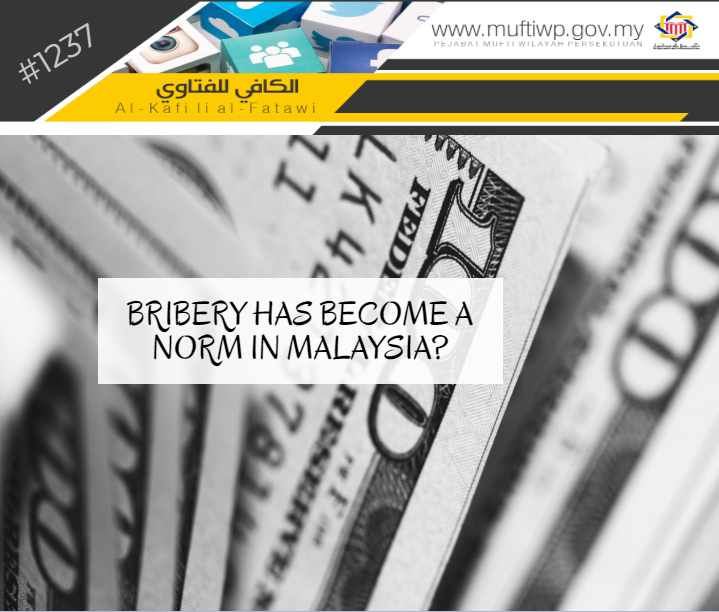Question:
Assalamualaikum SS Dato’ Seri Mufti. I hope for advice and opinion from SS Mufti regarding bribery that I observe is growing rampant in Malaysian society whether we realize it or not. Thank you.
Answer:
Waalaikumussalam wrt. wbt.
Alhamdulillah, praise and thanks to Allah for the many countless blessings He has blessed us all with. Blessings and salutations to the Prophet Muhammad PBUH, his wives, his family, companions and all those that follow his teachings to the day of judgement.
Understanding the Meaning of Bribery
We will first explain the meaning of a bribe. The word bribe originated from the Arabic word al-risywah (الرِّشْوَةُ). Al-Fayyumi said: al-Risywah (الرِّشْوَةُ) is something given by someone to a judge or another person, so that the judge would rule in his favour or as he want it to be. (See al-Misbah al-Munir fi Gharib al-Syarh al-Kabir, 3/411)
Ibn al-Athir said: al-Risywah (الرِّشْوَةُ) is a means that connects something to a want/desire through persuasion. (See al-Nihayah fi Gharib al-Hadith wa al-Athr, 2/226)
The term al-risywah is used to describe something given to nullify a permission or uphold wrongdoing. (See al-Mausu’ah al-Fiqhiyyah, 22/219). Dr Yusuf al-Qaradhawi said: “Taking a bribe includes taking the property or rights of another person, which could be money given to an officer or authority, so that the authority or officer would rule in his favour, or rule against his opponent according to his wishes, or prioritize or delay his affairs for certain interests and others.” (See al-Halal wa al-Haram fi al-Islam, pg. 627)
In Malay, the term bribe is used to describe a gift for a bribe or buy someone off. (See Kamus Dewan Edisi Keempat)
Syed Hussein al-Attas in his book Rasuah, Sifat Sebab dan Fungsi (Bribe, Traits, Reasons and Function), state that bribe is the abuse of trust for personal gains.
While according to the Malaysian Anti-Corruption Commission (MACC), a bribe is receiving or giving something as a payment to motivate an individual to do or not do something related to official work. Bribe could be in the form of money, gift, bonus, vote, service, position, discount. [1]
According to Laws of Malaysia in Section 3(a), (b) and 4(a)(b), Anti-Corruption Act 1961 (Amendment 1971) defines bribery as: “accepting or giving any forms of gratification to do or not do something related to principal's affairs,”. While, for gratification, according to Section 2, Anti-Corruption Act 1997; “money, donation, gift, loan, fee, reward, valuable security, property or interest in property being property of any description whether movable or immovable, or any other similar advantage,”
The Evidence of the Prohibition of Bribe
The prohibition of bribery is clearly stated in al-Quran and al-Sunnah. The prohibition is taken from the verse where Allah SWT curse the Jews who practises bribery. Allah SWT state:
سَمَّاعُونَ لِلْكَذِبِ أَكَّالُونَ لِلسُّحْتِ
“[They are] avid listeners to falsehood, devourers of [what is] unlawful.”
Surah al-Maidah (42)
Imam al-Baghawi commented on the above verse saying: “(the verse) is revealed explaining regarding the judges from among the Jews such as Ka’ab al-Asyraf and others like him. They receive bribes and ruled in favour of those who bribed them.” (See Ma’alim al-Tanzil, 3/58)
The same is stated in another statement of Allah SWT:
وَلَا تَأْكُلُوا أَمْوَالَكُم بَيْنَكُم بِالْبَاطِلِ وَتُدْلُوا بِهَا إِلَى الْحُكَّامِ لِتَأْكُلُوا فَرِيقًا مِّنْ أَمْوَالِ النَّاسِ بِالْإِثْمِ وَأَنتُمْ تَعْلَمُونَ
“And do not consume one another's wealth unjustly or send it [in bribery] to the rulers in order that [they might aid] you [to] consume a portion of the wealth of the people in sin, while you know [it is unlawful].”
Surah al-Baqarah (188)
Al-Sobuni said: “People from among you should not eat from the property of others through impermissible means stated by Allah SWT such as through bribery to the judges.” (See Sofwah al-Tafasir, 1/112)
While in a hadith from Abdullah bin ‘Amr R.Anhuma, the Prophet PBUH said:
لَعْنَةُ اللَّهِ عَلَى الرَّاشِي وَالْمُرْتَشِي
“The curse of Allah is upon the one who offers a bribe and the one who takes it.”
Musnad Ahmad (6984) and Sunan Ibnu Majah (2313)
In another hadith which was also narrated by Abdullah bin ‘Amr R.anhuma, he said:
لَعَنَ رَسُولُ اللَّهِ -صلى الله عليه وسلم- الرَّاشِىَ وَالْمُرْتَشِىَ
“The Prophet PBUH curse the one who offers bribe and the one who takes it.”
Musnad Ahmad (6532,6778,6830), Sunan Abu Daud (3582) and Sunan al-Tirmizi (1337)
Answering the above question, we would like to cite the statement made by Dato’ Sri Haji Zakaria bin Haji Jaffar, the President of Yayasan Anti Rasuah Malaysia (YARM), who among others state: “Bribery has become a part of our society’s lives, whether we realize it or not. Its presence is barely felt for the giver and acceptor are in agreement and compromise with each other in committing this transgression. The dangers of bribery are truly horrifying.” (See his book titled Man Ana Perjuangan Menentang Rasuah, pg. 42)
Bribery would greatly affect our lives. Here we include among its negative effects according to the book Rasuah: Punca, Kesan dan Penyelesaiannya (Bribe: Causes, Effects and Solutions):
- Destroy a country’s justice system
- Build unskilled society
- The rise of self-absorbed people
- Bad work performance and outcome
- Increase in management costs
- Administration management become slow and chaotic
- People are becoming meaner and more evil
- Unbalanced division of wealth
Lastly, let us all strive to avoid any type of bribery but consequently build our character with integrity and trustworthiness. May our country be free from any form of bribery. Amin.
Endnotes:
[1] See the official portal for the Malaysian Anti-Corruption Commission (MACC) through the link: http://www.sprm.gov.my/index.php/pendidikan/kenali-rasuah . Accessed on 21 April 2019.
